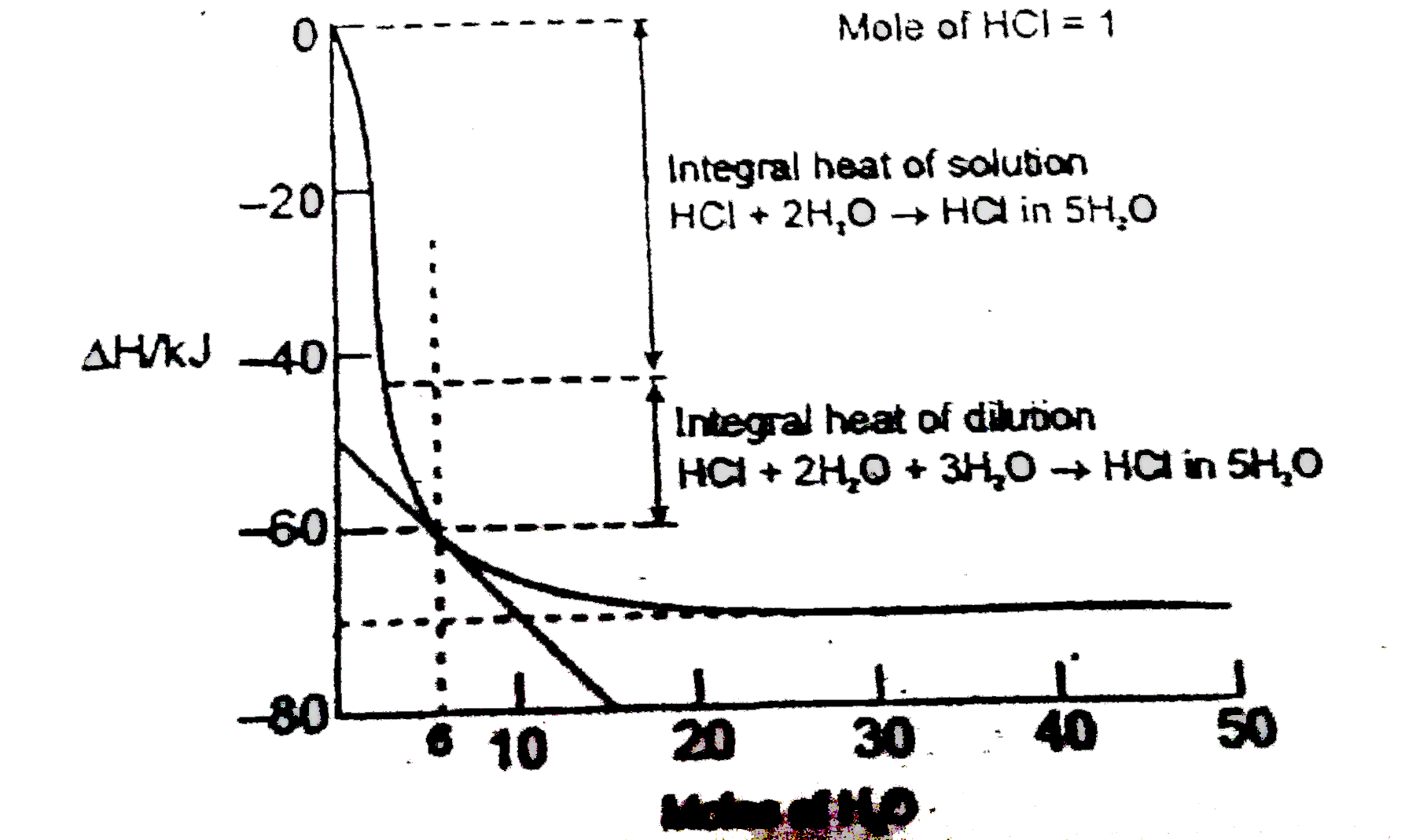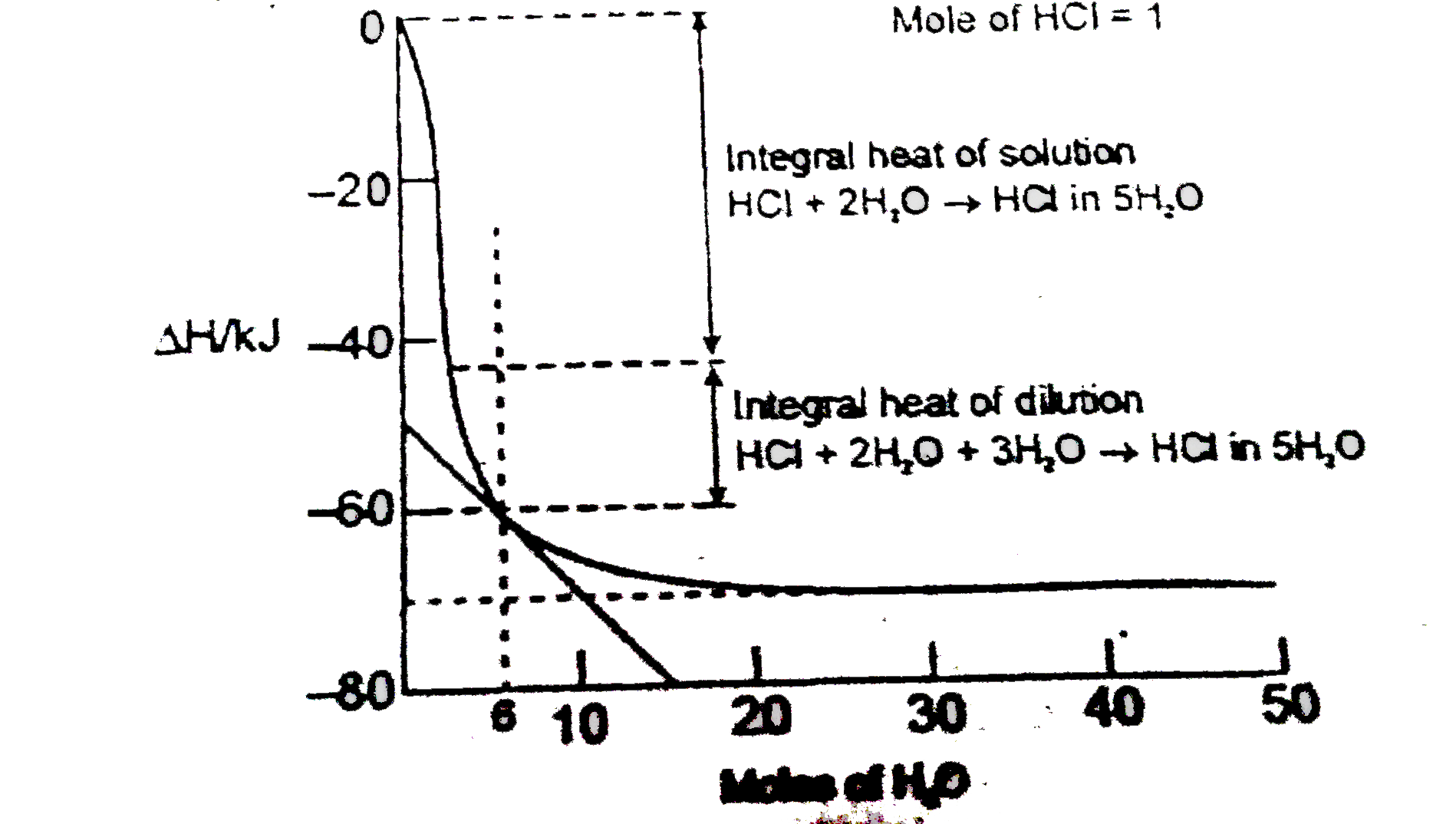The enthalpy in the process HCl+nH2O→HCl in n moles of H2O Where n is the number of moles of water, is called the integral heat of solution.When n is large enough that continued addition of water does not increase the heat of solution, one simply writes
HCl+aq→HCl(aq)
The enthalpy for this process is the limiting value for the integral heat of solution.The enthalpy for the process
HCl in n moles of H2O→ HCl in (n+m) moles of H2O
is called the integral heat of dilution.These quantities are indicated in figure.Another quantity of interest is the differential heat of solution, defined as the slope of the enthalpy curve. The heats of solution depend on the composition of the solution as shown in the figure.

What is the approximate enthalpy change for the reaction HCl+aq→HCl(aq)
−80 KJ/mole
−60 KJ/mole
−70 KJ/mole
−20 KJ/mole
The correct Answer is:C
NA
Topper's Solved these Questions
Similar Questions
The amount of heat liberated when one mole of NH4OH reacts with one mole of HCl is
View SolutionOne mole of solute AB dissolved in 20 moles of water absorbed 15.9 kJ of heat. When one mole of same solute is dissolved in 200 moles of water 18.58 kJ of heat is absorbed. Calculate the enthalpy of dilution.
View Solution
Knowledge Check
The enthalpy in the process HCl+nH2O→HCl in n moles of H2O Where n is the number of moles of water, is called the integral heat of solution.When n is large enough that continued addition of water does not increase the heat of solution, one simply writes
HCl+aq→HCl(aq)
The enthalpy for this process is the limiting value for the integral heat of solution.The enthalpy for the process
HCl in n moles of H2O→ HCl in (n+m) moles of H2O
is called the integral heat of dilution.These quantities are indicated in figure.Another quantity of interest is the differential heat of solution, defined as the slope of the enthalpy curve. The heats of solution depend on the composition of the solution as shown in the figure.

Integral heat of solution for the following step is :A−12kJB−44kJC+60kJD−60kJEnthapy of solution (ΔSolH∘) of a solute is the enthalpy change when one mole of it dissolves in ______of solvent
AexcessBan unknown amountCa specified amountDan infinite amountNumber of gram equivalents of solute in 100 ml of 5N HCl solution is
A50B500C5D0.5
One litre of a solution of N/2 HCl was heated in beaker and it was observed that when the volume of solution got reduce to 600 mL, 3.25 g of HCl was lost. Calculate the normality of the resulting solution.
View SolutionThe amount of heat liberated when one mole of NH4OH reacts with one mole of HCl is
View SolutionUpon heating 1 L of 2 N HCl solution, 36.5 g of HCl is lost and the volume of solution resuces to 800 mL. Calculate . (a). The normality of the resultant solution.
(b). The number of equivalents of HCl in 100 mL of the original solution..
View SolutionWhen mango is placed in 1N HCl solution, it
View SolutionUpon heating one litre of N/2 HCl solution, 2.67 gm of hydrogen chloride is lost and the volume of solution shrinks to 750 ml. The normality of resulting solution is
View Solution
